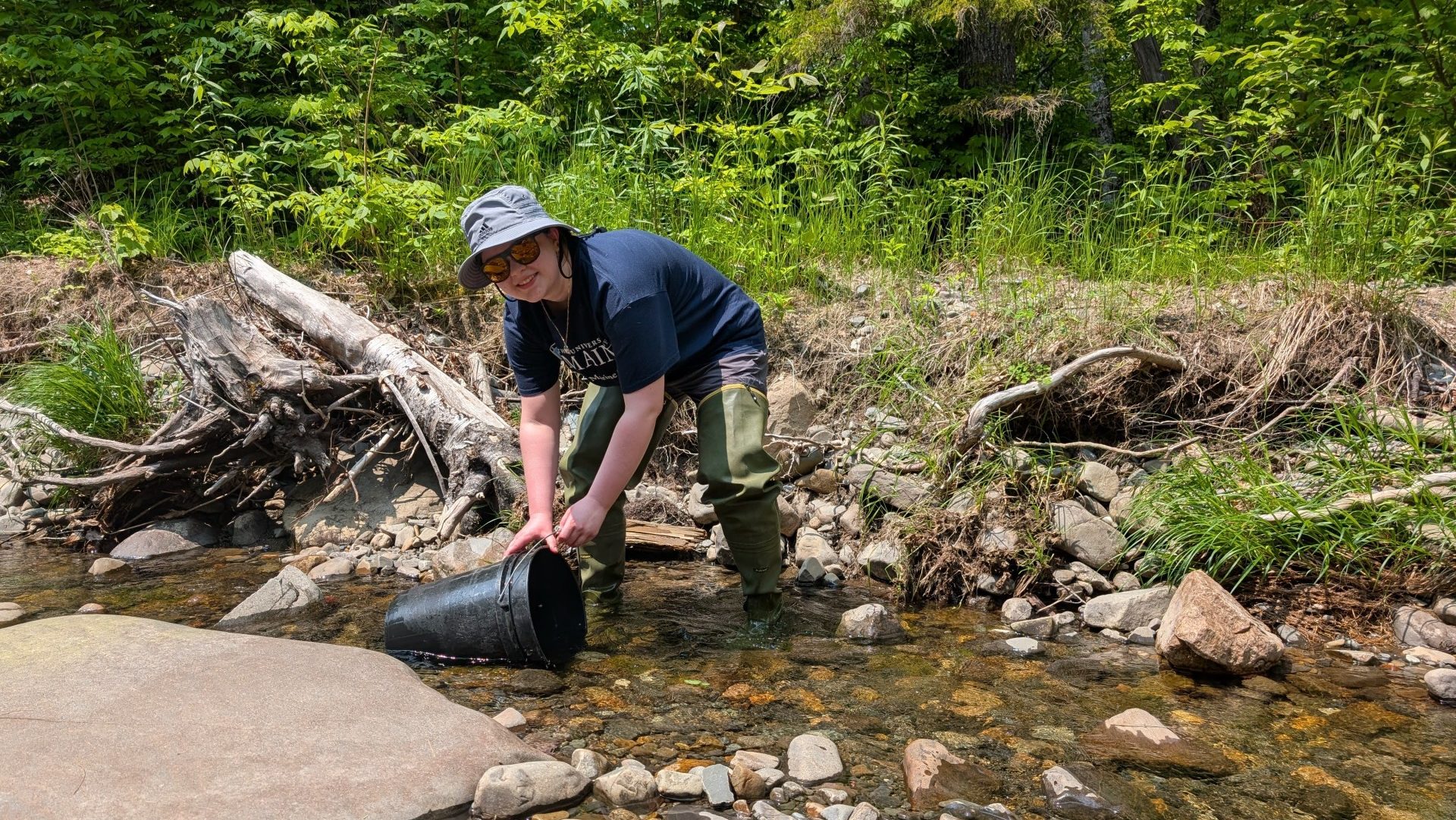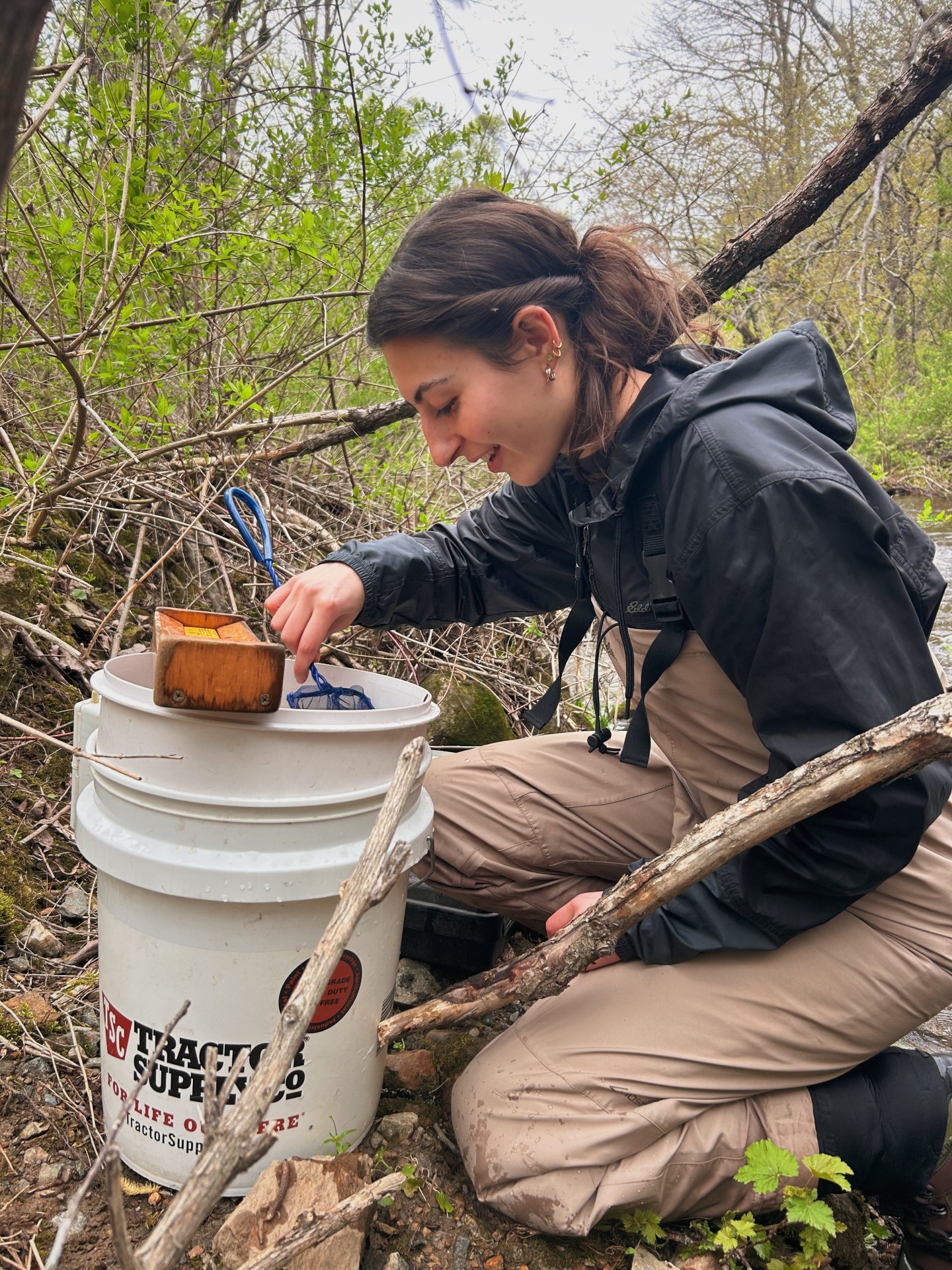
Maine Sea Grant helping state conserve Atlantic salmon
Whether it’s through fish stocking, habitat restoration or research, the University of Maine-led Maine Sea Grant is helping the Maine Department of Marine Resources (DMR) conserve Atlantic salmon in the Gulf of Maine — the last wild populations of the species in the U.S.
Through a program offered by Maine Sea Grant and NOAA Fisheries that is now in its sixth year, paid summer interns have been working with the department on Atlantic salmon research and conservation for 13 weeks each summer — from Downeast Maine to the Kennebec and Penobscot River watersheds. They conduct field and lab work to support this endangered species and other sea-run fishes.
“The Maine Sea Grant internship program not only supports the restoration of sea-run fish like Atlantic salmon but also fosters a two-way exchange of knowledge with the department,” said Sean Ledwin, the director of DMR’s Bureau of Sea-Run Fisheries and Habitat. “The interns learn firsthand from experienced professionals in the field, while bringing fresh energy, new ideas and capacity to vital restoration efforts. This collaboration strengthens conservation outcomes and builds the next generation of marine scientists and stewards.”
“This program emphasizes collaborations and partnerships that expose students to different career paths to help conserve vital species and support Maine ecosystems, economies and cultures,” said Julia Hiltonsmith, a UMaine Sea Grant graduate assistant who mentors sea-run fish interns. “Guiding these interns through their fieldwork has not only deepened my appreciation for the dedication they’ve brought to conservation but also reinforced the importance of fostering collaboration and professional growth in the next generation of marine scientists.”
Since the Sea-Run Fish Internship Program launched in 2020, 12 students from UMaine and its regional campus, the University of Maine at Machias, have participated and conducted research and conservation work statewide for DMR, the United States Geological Survey, the Maine Department of Environmental Protection and the Penobscot Nation. Black Bear students, as well as participants from other universities, have gained hands-on learning experiences and professional development in science communication, which prepare them for in-demand careers in marine sciences and conservation.
“Maine Sea Grant is deeply committed to serving the public and helping to build a workforce that is skilled, prepared and ready to address the critical issues affecting our coastal communities and ecosystems,” said Maine Sea Grant Director Gayle Zydlewski. “The Sea-Run Fish Internship Program is a clear example of this commitment. We’re proud to continue our partnership with Maine DMR and NOAA Fisheries to align workforce development with pressing marine needs.”
Rory Hannon, a UMaine wildlife ecology master’s student, was an intern with the program in summer 2023. At that time, he worked with DMR to help salmon pass through the Milford Dam fishway trap and sort facility and collected data on salmon and other sea-run species.
“Working at Milford fishway opened my eyes to the importance of sea-run fish passage and the impact that dams have,” Hannon said. “This internship gave me both the tools and professional relationships needed to continue studying Atlantic salmon migration as a grad student.”
This year’s Maine Sea Grant-supported interns are Wade Hill from Maine Maritime Academy and Olivia Ellis and Audrey Fox from the University of New England.
Hill is working at the Milford Dam fishway trap and sort facility to stock river herring, record population data, assist salmon and herring with passing through the fishway and collect and prepare scale samples for age analysis.
Ellis is helping DMR scientists and conservationists relocate salmon from certain sections of the Kennebec River to better their chances of survival; conducting assessments of salmon and other species on the Kennebec and nearby Sheepscot rivers; surveying the number of available habitats; and developing educational materials for K-12 students.
For her second summer as a Sea Grant intern, Fox is working with the DMR on habitat preservation for salmon and other sea-run fishes in Downeast Maine, particularly along the Narraguagus River in Cherryfield and East Machias River.
The program is one of Sea Grant’s educational offerings that prepare future scientists and conservationists while growing Maine’s workforce. The program also conducts and sponsors research that helps the state and nation navigate ecological and sociological changes and expand the blue economy — industries that use ocean resources for economic growth — without jeopardizing the environment. Its work is supported through collaboration with 33 other NOAA Sea Grant programs.
Contact: Marcus Wolf, 207.581.3721; marcus.wolf@maine.edu

